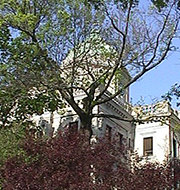Service-Learning
About Service-Learning
Only so much I know as I have lived. —RW Emerson
Service-learning is a form of experiential or active learning ("learning by doing") that involves partnerships between students and communities. Service-learning is not the same as volunteering. The latter simply means to freely offer oneself for a service. In contrast, service-learning explicitly connects meaningful community service with academic learning, personal growth and civic responsibility.
In service-learning, the service is a mechanism, sometimes referred to as an alternate course text, by which students can deepen understanding of course content and its application to the "real world" as well as explore their own roles as citizens of society.
Thus, service-learning is a two-way street; the community benefits from the service provided and the student benefits from both academic learning and personal growth opportunities.
Reflection, or careful consideration of the service in the context of course content, is an essential bridge between theory (course content) and practice (service-learning experiences and their relationship to personal growth and the civic arena).
The Service-Learning Program at Indiana University Bloomington provides answers to FAQs about service-learning and other helpful resources for faculty and students.
References
- Boyer, EL. 1996. The Scholarship of engagement. Journal of Public Service and Outreach. 1,1:11-20.
- Bringle, RG and JA Hatcher. 1999. Reflection in service learning: making meaning of experience. Educational Horizons. Summer:179-185.
